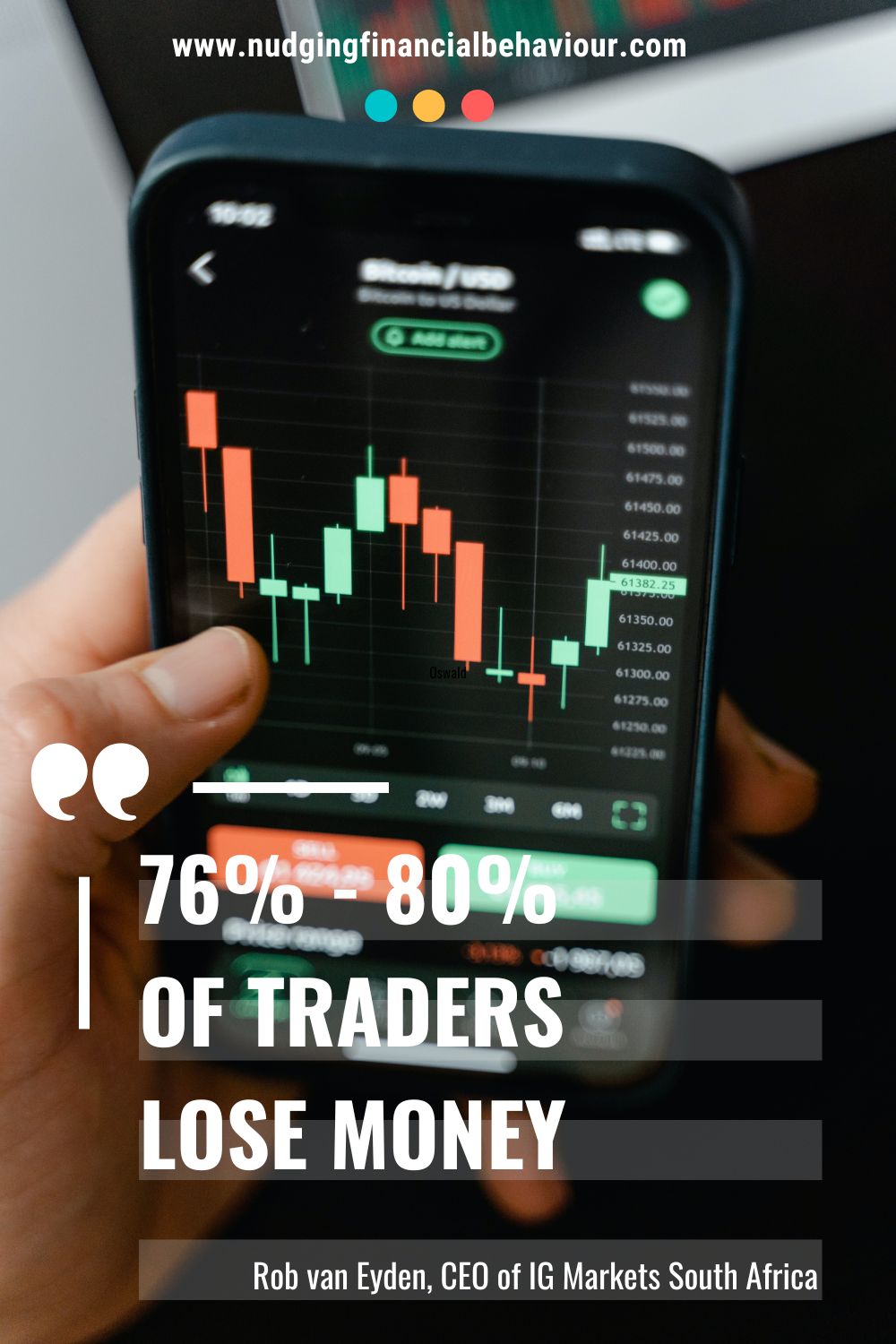Let’s get ready to unpack some behavioural finance theory together. Welcome to the first edition and first episode of our behavioural finance podcast. We hope we get added to your list of podcasts worth listening to.
Two reasons why you should follow our behavioural finance podcast. Firstly, we want to help you understand that every single one of us is impacted by internal and external biases when it comes to decision making. Most of the time, we’re barely even aware that these biases are pushing us to make decisions that aren’t entirely rational. While this isn’t always a bad thing, it’s not always a good thing either – especially when it comes to financial decisions.
Secondly, we want to help you identify these biases in your own life, and give you tools to figure out if those biases are causing you to make bad decisions about your money. If so, hopefully we can help you change that!
The Nudging Financial Behaviour podcast will help you understand your money decisions better. And help you figure out how you can change some of your financial behaviour that’s less than ideal. Share on XThere are various ways you can follow our behavioural finance podcast. You can listen to the podcast on whichever podcast platform you subscribe to. Or, you can subscribe to our YouTube channel and catch the episodes there. But if watching or listening isn’t your thing, then feel free to continue reading because we’ll always have a full blog post available to you. Pick the one that suits you best, and please, feel free to share it on social media and directly with others. And tell them to subscribe so they don’t miss out!
In order to do figure out how we can change some of our financial behaviour, we want to first give you a bit more insight into what Behavioural Finance actually is. It’s sort of a marriage between Technical Finance and Psychology.
This field of study started in the 1980s. It was founded by two psychologists – Daniel Kahneman and Amos Tversky – and the economist – Robert J. Shiller.

Their early experiments monitored people and the decisions they made about their money. The researchers would identify the irrational decisions the participants made, tell them they were making less than optimal decisions, and even explain why. But the participants went on making the same irrational decisions again and again…
The conclusion that these three researchers came to was that it wasn’t the markets that were responsible for all the fluctuation – but the irrational behaviour of the people investing in the markets that were partly to blame. In fact, rather largely to blame.
People being risk averse and making emotional decisions are what cause rapid changes in the markets. Share on XEven the most rational or logical person has a limit to their self-control. There always comes a point when assumptions, personal perceptions and emotions start to play a bigger and bigger role in decision making.
This is why there is consistently a difference between the actual performance of the market and what an investor earns.
An American study showed that in the 20-year period between 2000 and 2019, equity investors earned an average of 4.25%. But the S&P 500 (a stock market index in the US) gave a return of 6.06%. If these investors were making decisions based on purely the facts, they should have been closer to that 6%, not almost 2% lower.
Behavioural finance focuses on the human aspect of investing and trading. It’s about using the information that comes from studying Behavioural Finance and applying it to individuals and the way they make decisions about money – and we’re not just talking about investing and the market, we’re talking about all financial decisions that you make. This includes your retirement plan, saving for big ticket items like a new car or house or a holiday, paying your bills on time, and even just your everyday spending habits. We can make endless lists of where behavioral science interacts with personal finance, thanks to our human behavior.
Behavioural biases are going to be a big part of what we cover in this podcast. The more you know about them, the more you’ll be able to spot them at play when you make decisions. We’ll take it one financial decision at a time to make sure we get things right.
Now, remember, allowing biases to influence your decision making doesn’t mean that you’re weak minded or not in control of your own mind. It’s completely natural and only human to be influenced by your biases. What we want to help you with is understanding WHAT those biases might be in your life and how to recognise them when you’re making important decisions.
In this episode we had a quick chat to Rob Van Eyden, CEO of IG Markets South Africa, as sponsor of this podcast. Now, why might a trading company be interested in this behavioural finance podcast. Here’s what Rob had to say:
This is a known fact… as a London-based company we need to indicate how many of our traders fail, or how many of our traders lose. So globally, if you look at leveraged products about 76% – 80% of traders lose money. And the biggest culprit is not that they’re getting the direction wrong. It’s basically they’re getting their emotions wrong in terms of managing their positions.

Daily FX did some research on more than 12 million real trades and showed that traders are correct more than 50% of the time. So, if traders tend to be right more than half the time, why do they more often than not lose money? Because… they lose more money on their losing trades than they make on their winning trades. They’re not closing out a losing trade and admitting they were wrong. Emotions! Fear, hope and greed – to be specific. And thus small losses turn into big losses.
Let’s go through a quick rundown of the main biases you’ve likely encountered. I promise there will be a lot more information coming in future episodes where we’ll really drill down into each of these biases. But let me whet your appetite quickly.
Let’s start with the emotional biases. These include overconfidence and confirmation bias. The first one is easy – when you’re overconfident, you tend to think you know more than you actually do, and your decisions can go very badly if you don’t genuinely know enough. Overconfidence has been blamed for a number of disasters ranging from the dotcom bubble bursting in the 1990s to the sub-prime lending crisis that ended disastrously in 2008. Even the First World War and the War in Iraq have been blamed by historians and political scientists to be as a result of overconfidence.
Confirmation bias is when we have an idea or an opinion about something and then we look for information that confirms what we already believe. Just look at how you Google a topic – if you’ve heard good things about Bitcoin and want to start investing in it, you’ll use the search term “Is Bitcoin a good investment”. On the other hand, if you’ve heard bad stories, you’ll more likely search “Is Bitcoin a bad investment”. You’re already stated what you believe and are looking for confirmation of that belief.
Another big bias is that of framing. The framing effect is – in a way – similar to confirmation bias, but it’s more about how information is framed for you. It’s possible to be provided with exactly the same information but the wording used makes you see the information differently. If the same choice is framed as a loss, rather than as a gain, you’ll likely make a different decision.
Confirmation bias is when we have an idea or an opinion about something and then we look for information that confirms what we already believe. Just look at how you Google a topic – if you’ve heard good things about Bitcoin and want to start investing in it, you’ll use the search term “Is Bitcoin a good investment”. On the other hand, if you’ve heard bad stories, you’ll more likely search “Is Bitcoin a bad investment”. You’re already stated what you believe and are looking for confirmation of that belief.
Another big bias is that of framing. The framing effect is – in a way – similar to confirmation bias, but it’s more about how information is framed for you. It’s possible to be provided with exactly the same information but the wording used makes you see the information differently. If the same choice is framed as a loss, rather than as a gain, you’ll likely make a different decision.
The last one we want to mention is the anchoring bias. An anchor can be something related to what you’re making a decision about, or it could be completely arbitrary. When you’re given a number as an anchor point and then asked to provide a value for something – anything, a house or a cup of coffee – that anchoring number will influence the value you assign. Let’s look at real estate as an example. If an estate agent is asked to value a property and is told what the house is listed at, that asking price will impact the valuation the expert gives – even if the asking price is wildly inappropriate for the market, the property and the neighbourhood.
This was a bit of a teaser. We’re going to discuss each of these biases in more detail later in this season. And we’ll share some examples you can relate to as well as some behavioural finance research topics. Also, we’ll be speaking to different experts where we can. We’ve even got New York Times best-selling author, Dr Daniel Crosby, coming up in one of our future episodes.
Even with these brief examples, we’re hoping you can see how biases are so deeply rooted in the way we think and make decisions. And that’s why it’s so important to be able to recognise them and acknowledge them in your decision making.
This is why we’re doing this podcast – to help you. And you’ll learn a lot of things along the way. Things that aren’t very widely known.
The thing is, if we don’t have a much firmer handle on what behavioural biases are, it’s very hard to tell how they’re impacting our ability to make decisions.
When you do the work to become more aware of behavioural biases, you’ll quickly realise how your decision making will become more rational. And when you apply more rational decision making to your finances, well – you’ll end up saving more and earning more through better investment decisions. Doesn’t that sound nice?
Look, we’re not saying it’s a superpower. We’re still human. We’re still influenced by our emotions. But the awareness is powerful!
We hope you’re ready to delve into your biases and learn how to recognise them when you’re making decisions about your finances. But before we jump into that, in the next few episodes we’ll first be discussing some behavioural pitfalls that get us into financial trouble.
First up, we’re going to discuss financial illiteracy, and some of the basic financial terms you need to have under your belt. We’re focusing an entire episode to that.
Then, we’ll discuss some other pitfalls. Things that aren’t always what we want to hear, but if we can understand how and why things can go wrong so easily with our finances, it makes it easier for us to isolate the emotion from the decision making.
We firmly believe that it’s important to understand each of these pitfalls before we start talking about our biases. So, we need to cover some groundwork first to approach financial crossroads. Then, we’ll unpack the behavioural finance biases one by one.
It’s going to get interesting, so, we hope you’ll subscribe to either the YouTube channel, our behavioural finance podcast, or to our mailing list for the blog. We’d also love to hear from you, so feel free to comment below with questions or thoughts about what we’ve discussed and tell us what you liked.
Chat soon!
Narrow framing – Narrow framing, the compromise effect, glossing, and the enabling frame. We need frames to make sense of the world. But they cause problems.
The anchored trader – Anchors tie us down and can have serious consequences for investors and traders. Don’t be the anchored trader.
Let us know in the comments below.
I am passionate about helping people understand their behaviour with money and gently nudging them to spend less and save more. I have several academic journal publications on investor behaviour, financial literacy and personal finance, and perfectly understand the biases that influence how we manage our money. This blog is where I break down those ideas and share my thinking. I’ll try to cover relevant topics that my readers bring to my attention. Please read, share, and comment. That’s how we spread knowledge and help both ourselves and others to become in control of our financial situations.

Dr Gizelle Willows
PhD and NRF-rating in Behavioural Finance
Receive gentle nudges from us:
[user_registration_form id=”8641″]
“Essentially, all models are wrong, but some are useful.” – George E.P. Box
